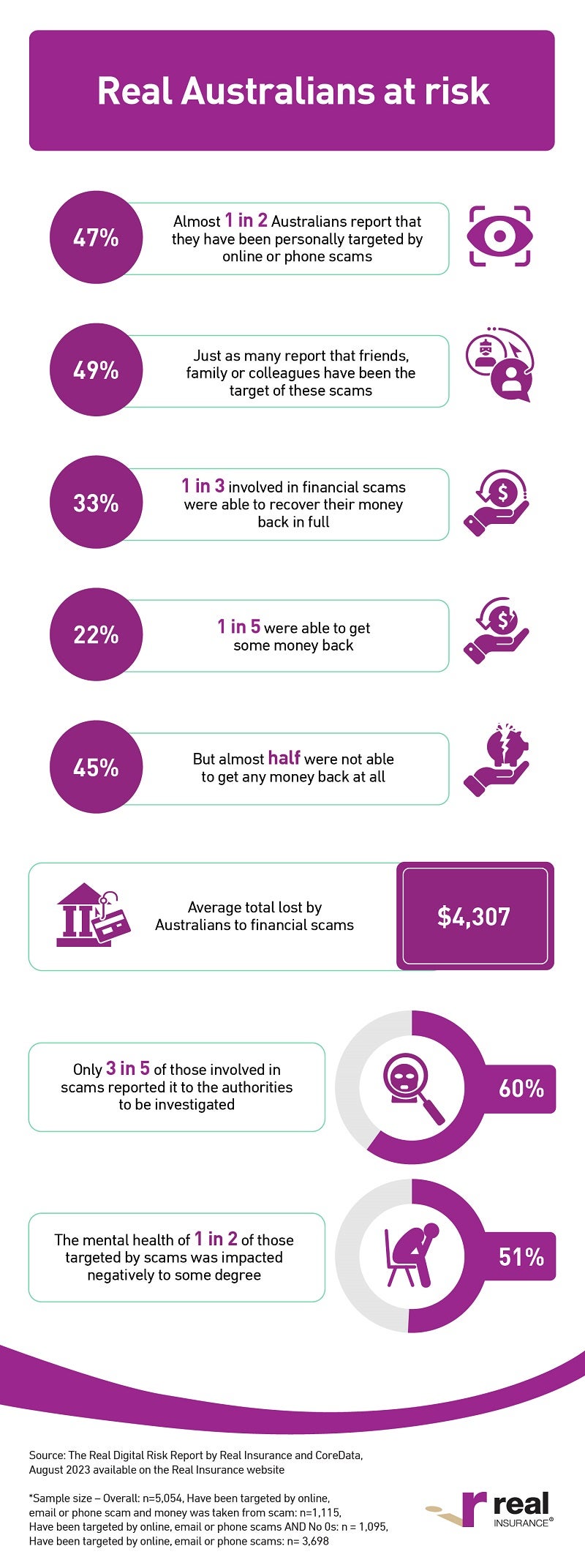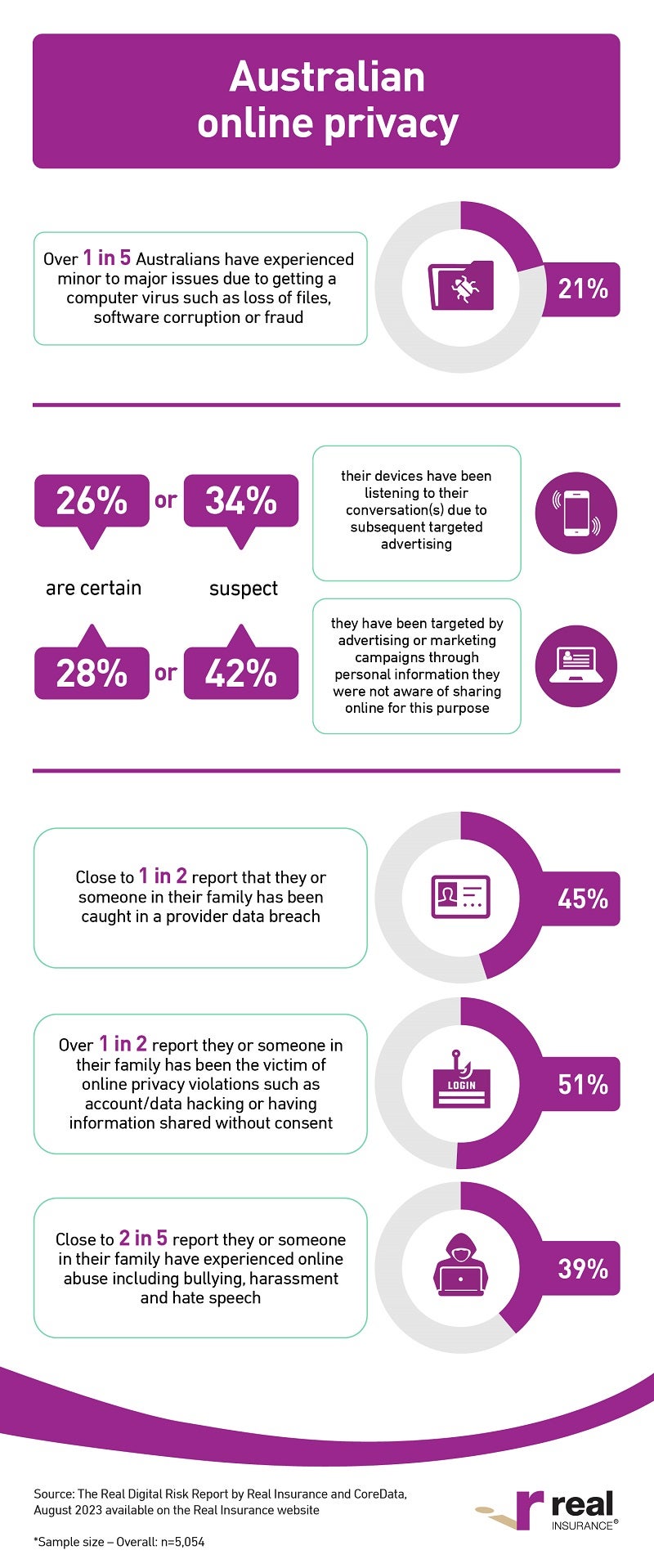The Real Digital Risk Report 2023
18 Aug 2023
Understanding the risks of cyber security
We’ve all experienced scam emails or texts, and with the internet being such an integral part of our lives, it can be easy to forget that not everyone or everything we encounter online has our best interests at heart.
As our lives increasingly move online, it can feel as though there are countless scams waiting to prey on unsuspecting people trying to go about their daily activities. Whether it’s online dating, shopping, banking or just simply checking your emails, the threat of cybercrime is ever-present.
The Real Digital Risk Report 2023 which surveyed more than 5,000 Australians, forms part of the Real Insurance Research Series and explores the attitudes and behaviours of Australians over 18 concerning the risks associated with their online activities. The research also looks at the concerns of parents regarding their family’s safety in the digital realm and Aussies’ perceptions of the increasing use of AI tools.
Online safety: Fear of the unknown risks
We’ve all experienced that moment of hesitation when faced with a suspicious link or unknown phone call, fearing that we might fall victim to a scam. It’s no wonder that almost all Aussies over 18 expressed that some of their primary concerns are the safety of their private information online (92%) and scams (90%).
When it comes to digital privacy, most of us worry about data hacking (69%), identity theft (67%), privacy violations (54%), company data breaches (53%) and social media privacy (43%), with the majority feeling that they and their families are most exposed to online risks through smartphones (73%), computers (69%), and smart home devices (19%).

Online scams: You’ve been scammed
If you’ve ever been a victim of a scam, you’re not alone. Nearly half of us claim to have been targeted, either online or by email or phone (47%), and an alarming portion know a friend, family member, or colleague that has fallen victim to a scam (49%).
The most common types of scams experienced by individuals include phishing or smishing (50%), online shopping payment scams (38%), and technical support scams (32%).
While you may feel confident in your ability to recognise a scam and spot one from a mile away, it’s crucial to be aware of the evolving tactics employed by scammers. Shockingly, more than a third (34%) of individuals who have been targeted by scams reported that hyper-realistic-looking fake websites, emails, and social media profiles led to the successful execution of the scam.
As scammers continue to up the ante, it becomes increasingly harder to detect malicious software online, leaving most of us feeling nowhere is safe.

The cost of online fraud
The cost-of-living crisis isn’t the only thing hurting our wallets. The average amount of money taken from Aussies over 18 through online, email, or phone scams is a whopping $4,307! Sadly, less than half (45%) of those who lost money were unable to recover any of it.
Aussies have also been spending money on staying safe online by investing in services and antivirus/antimalware software (40%) to enhance the security of their devices. Almost a quarter (21%) have also allocated funds for a firewall or have spent money on a Virtual Private Network (18%).

Shh...they’re listening!
Social media hacks are also on the rise, with almost a quarter (24%) of Aussies – either themselves or a family member – falling victim. To top it off, another quarter (23%) have experienced data hacking or have had their personal information or pictures shared online without their consent (11%).
Another issue capturing our attention is the phenomenon of devices listening to our conversations. If you've ever discussed a specific product and then suddenly seen it appear on your social feed, you're not alone. Just over a quarter (26%) of Aussies are convinced that one of their devices has been listening to their conversations, leading to subsequent advertising. Additionally, slightly more (28%) are certain that they have been targeted by advertising or marketing campaigns using personal information they unknowingly shared online for this purpose.

Online scams: Impact on wellbeing
Beyond the financial repercussions of scams, they can also take a toll on mental health and overall well-being. The report suggests that more than half (51%) of Aussies targeted by scams experienced negative well-being or mental impacts to some degree.
When it comes to scam prevention, almost all (97%) agree that there should be stricter penalties for cybercriminals in Australia. Additionally, most (89%) believe the Australian government should consider banning certain foreign companies if they pose potential cybersecurity risks.
Online safety for kids
As parents and caregivers, we would like to trust our kids to be responsible online, but we all know children can be easy targets. Many parents with children under 18 years old are most concerned about their child being exposed to cyberbullying or harassment (68%), followed by concerns about online predators and cyberstalking (61%) and exposure to porn or sexually inappropriate content (59%).
With many interactions these days taking place in the digital realm, it’s no surprise that some parents (17%) reported that their child(ren) have met someone in real life whom they only knew online. Further, a quarter (25%) said their child(ren) have online friends or acquaintances whose identity they have no knowledge of.
For some parents, the worst-case scenario can sometimes become reality, with over a third (34%) of parents with children 18 years and below having encountered a situation where one of their children was exposed to inappropriate content. Additionally, just over a quarter (26%) said their child was exposed to abusive behaviour online. And when it comes to cyberbullying, some Aussies – either themselves or a family member – have experienced cyberbullying (16%) or online harassment (15%).
Parents are willing to go to great lengths to protect their kids, but the increasing dependence on technology is exposing children to greater online dangers. Consequently, it's hardly surprising that nearly all parents (96%) with children under 18 agree that online safety should take priority over respecting their child's privacy.
For those vigilant parents (or should we say responsible?) who have children 18 years and below with their own social media accounts, more than a third (34%) have accessed their children's social media accounts to monitor their activity. Additionally, more than half of parents who had accessed their children’s social media accounts (51%) have either created or considered creating a "fake" social media account to monitor their children’s social activities without their knowledge.

AI Revolution: The rise of AI
The rise of artificial intelligence (AI) is also an unavoidable reality, bringing both promise and the need for caution when using AI tools for work and play. With the popularity of AI continuing to grow, it’s no wonder most (59%) Aussies have heard of, tried, or are regularly using the latest popular language AI tools like ChatGPT. When it comes to trustworthiness, many (55%) current language AI tool users trust its accuracy either considerably or completely.
However, most (69%) of those who are currently using, have tried or planning to try AI language tools have also expressed concerns about the privacy and security of the information they might share with these platforms or tools.
In today’s interconnected world, where technology plays a central role in our lives, it’s crucial to be aware of the looming cyber risks that can compromise our security. The consequences of falling victim to cyber threats can be severe, ranging from financial loss to identity theft and even emotional distress. However, advancing technology also provides countless opportunities and benefits, from connecting people all around the world to improving everyday life.